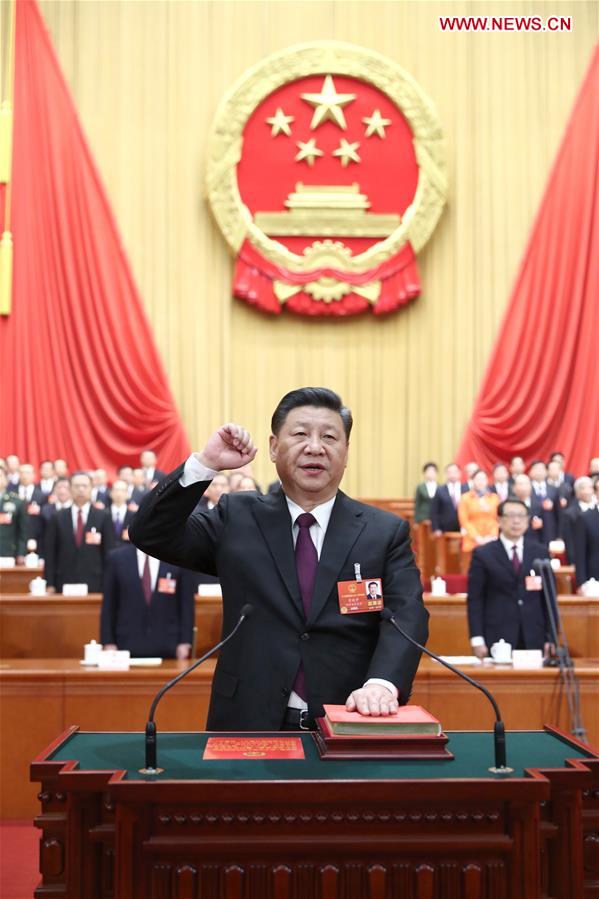Chinese president takes oath of allegiance to Constitution for first time
 0 Comment(s)
0 Comment(s) Print
Print E-mail Xinhua, March 17, 2018
E-mail Xinhua, March 17, 2018

"I pledge my allegiance to the Constitution of the People's Republic of China (PRC) to safeguard the Constitution's authority, fulfill my legal obligations ..." Newly elected Chinese President Xi Jinping took the solemn oath in Beijing Saturday.
This was the first time for a Chinese president to take a public oath of allegiance to the Constitution upon assuming office.
Xi was elected Chinese president and chairman of the Central Military Commission (CMC) of the PRC earlier Saturday at the ongoing first session of the 13th National People's Congress (NPC), the national legislature.
Last October, he was elected general secretary of the Central Committee of the Communist Party of China (CPC) and appointed CMC chairman of the CPC at the first plenary session of the 19th CPC Central Committee.
With the national emblem hung up high in an auditorium inside the Great Hall of the People, everybody stood and a hard copy of the Constitution was brought to the stage by honor guards as the ceremony started at around 10:49 a.m.
After a chorus of the national anthem was sung by all present, 64-year-old Xi, in a dark suit, took the podium, placed his left hand upon the Constitution, raised his right fist, and read the oath.
"[I pledge to] be loyal to the country and the people, be committed and honest in my duty, accept the people's supervision and work for a great modern socialist country that is prosperous, strong, democratic, culturally advanced, harmonious and beautiful," he said.
He then bowed and returned to his seat amid warm applause.
The ceremony was held just six days after the national legislature added oaths of allegiance into the newly-amended Constitution Sunday.
The amendment also added Xi Jinping Thought on Socialism with Chinese Characteristics for a New Era as a guiding theory for China.
Based on a legislative decision passed by the top legislature in July 2015, China put the system into effect in January 2016, requiring all state functionaries to take a public oath of allegiance to the Constitution when assuming office.
The PRC enacted its first Constitution in 1954. The current Constitution was adopted in 1982 and amended in 1988, 1993, 1999, 2004 and 2018.
Joining NPC deputies in a panel discussion on March 10, Xi urged officials to uphold rule of law, oppose rule of man, be in awe of the Constitution, and exercise their duty within the boundaries of the Constitution and laws.
The ceremony was broadcast live via state television and the Internet.
"By taking the lead in swearing the oath, the president is telling the public that every one is equal in front of the law, and there is no exception," said Xiao Shengfang, an NPC deputy and vice president of Guangdong Lawyers Association. "It shows commitment by the Chinese leadership to rule of law, which will ensure China's journey toward modernization."





